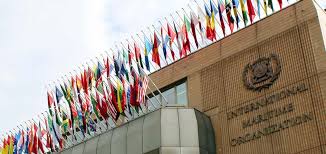
‘Failure Not an Option’ as IMO Opens MEPC 76 Climate Meeting
LONDON : The much anticipated meeting of the International Maritime Organization’s (IMO) Maritime Environment Protection Committee (MEPC), officially MEPC 76, kicked off its first two days of sessions this week before taking a weekend break.
Most of the shipping community’s MEPC 76 attention is focused on the status of proposed Amendments to Annex VI of the MARPOL convention dealing with the Energy Efficiency of Ships and the Reduction of Greenhouse Gasses (GHG) in Ships. The meeting will continue next week from June 14th though the 17th.
In late May, an intersessional working group had developed proposed guidelines on the technical requirements for reducing carbon intensity, based on the new Energy Efficiency Existing Ship Index (EEXI), had also spelled out proposed operational carbon intensity reduction requirements (based on a new operational carbon intensity indicator, or CII- with its “A” to “E” rating scale). Both are part of an action plan of “Initial Measures” that would get shipping on a path on reducing CII by at least 40% by 2030, a necessity for the longer term goal of reducing international shipping’s total annual GHG emissions by at least 50% by 2050 (compared to 2008).
Day One saw an opening speech by the IMO’s Secretary General Mr. Kitack Lim, in which he borrowed a line, famously spoken in preparation for the rescue of astronauts fifty years ago. He told all that “Failure is not an option” in the IMO’s efforts to agree on the measures that would start shipping’s journey to 2030- the principal subject of MEPC 76, and next steps- as the IMO starts to lay out a the path to 2050.
During the Day One session, following Mr. Lim’s remarks, a document on GHG reduction, prepared in late 2020 following MEPC 75, with draft amendments to MARPOL Annex VI (the part dealing with air quality, engines and fuels) – including the nitty gritty on EEXI computations and on the initial CII ratings, was discussed. With some edits, it was forwarded to the group that will draft the actual language that, after final approval, will be inserted into the Convention. The group agreed that entry into-force of the actual Annex VI amendments, would be November 1, 2022, while the date for the effecting the actual rules remains January 1, 2023.
Much of Day Two’s activity concerned the all-important process of fine-tuning and re-examining concerns about the varying effects of the new measures on different countries- with a focus on least developed countries (LDCs) and small islands developing states (SIDS). Implicit in these discussions was the fact that IMO studies on the impacts of the proposed rules were conducted very quickly, and during times of volatile shipping market conditions owing to 2020’s pandemic situation. Though the IMO follows diplomatic protocols, real maritime shipping is infused into the proceedings. Slow-steaming, which reduces vessel ton miles (part of the CII calculations) and actual emissions of carbon due to reduced engine power (part of EEXI) loomed large in the discussions. For example, the delegation from Chile, an exporter of copper concentrates, expressed a concern about the impacts of longer voyage durations as vessels adjust their operational practices.
Tied to the questions about possibly unequal impacts of new rules, were discussions about the nature of the review and adjustment process, including whether negatively impacted LDCs and SIDS, or countries with peculiar trade patterns (think about isolated islands, for example), might gain exemptions from the new regulations on Day One. An alternative approach under consideration suggested that a subsequent MEPC review of the initial steps, in 2023, closely look at “lessons learned” and then consider further action, when disproportionately deleterious impacts on certain countries, if any were observed and documented. These could be assessed, and dealt with by the MEPC, with possible revisions, in 2026.
The Day Two (Friday) discussion will continue on Monday, June 14th. Because of ongoing travel restrictions, these meetings- like other IMO “gatherings” over the past 15 months, are being held in a virtual conference format. With delegates participating from far flung time-zones, the daily meetings are three hour affairs- held during the optimal time of late morning U.K. time.
Source gCaptain

